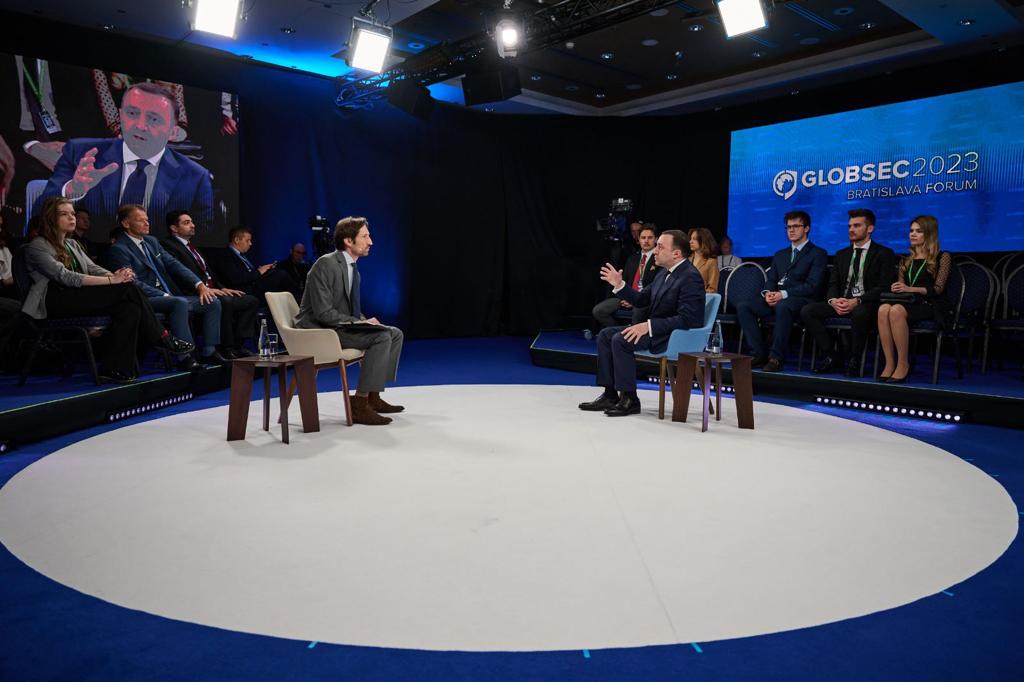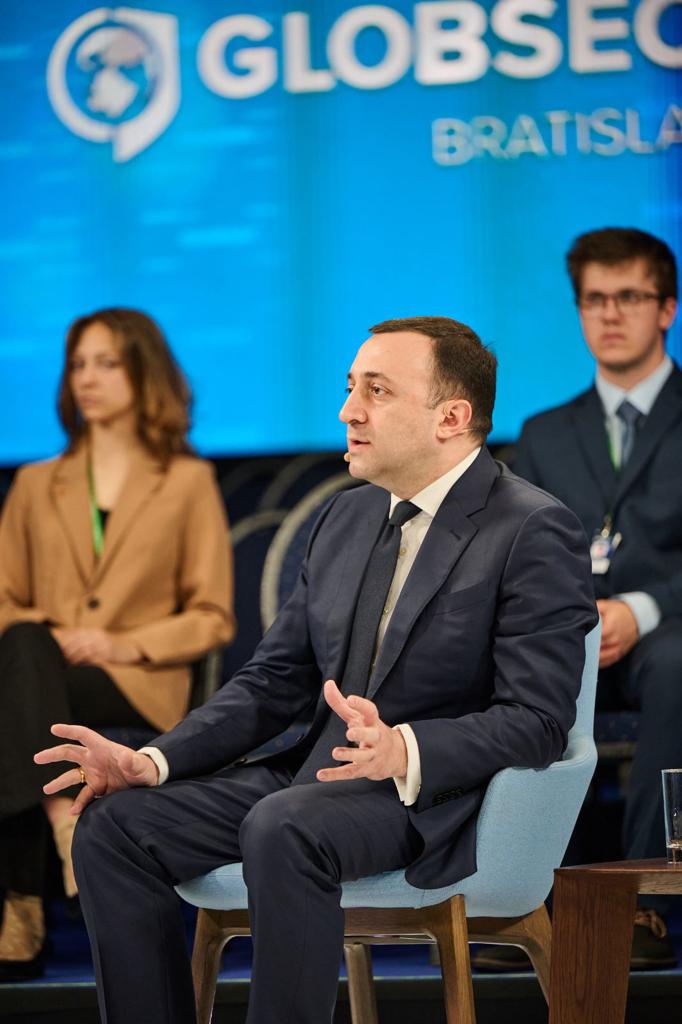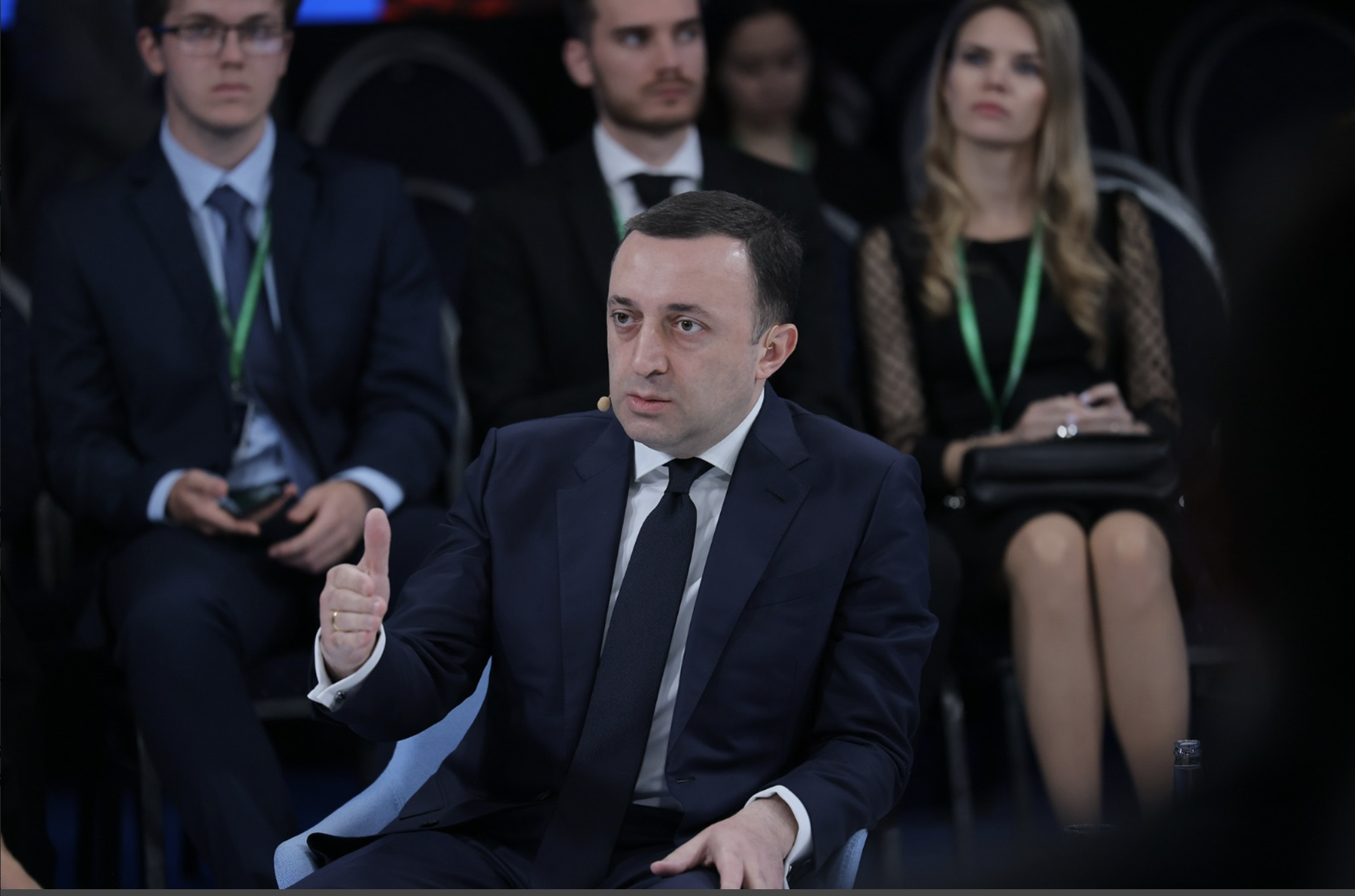Georgian Prime Minister Garibashvili at GLOBSEC 2023 – “NATO expansion caused the war in Ukraine, but the United States is our number one strategic partner.”
Petra Bošková
From May 29 to 31, 2023, Bratislava became the centre of international political discussions. The GLOBSEC Bratislava Forum brought together high-level stakeholders from a variety of fields to develop groundbreaking ideas and solutions that will define the changing global order.
In particular, the war in Ukraine – its effects on the international system, possible solutions, and the ongoing cooperation of states within the European Union – was a major topic of discussion.
Georgian Prime Minister Irakli Garibashvili also visited the Forum and took part in a thematic discussion where he spoke about the war in Ukraine, granting of candidate status to Georgia, international sanctions against Russia, and the draft law on “foreign agents.”
The War in Ukraine
Right from the start, the Prime Minister began to discuss the war in Ukraine, its consequences, and comparisons with the brief war between Russia and Georgia in 2008. However, what caught almost the entire audience by surprise was Garibashvili’s response to who caused the war. The prime minister said, “One of the main reasons was NATO, NATO enlargement.” “I don’t want to speculate, and I don’t want to quote the statements of the Russian government, but one of the reasons was Ukraine’s will and determination to become a member of NATO. Therefore, we see the consequences,” he said, adding that he could not see any effort or will on either side to end the war.
With respect, Georgia does not seem to understand the seriousness of the situation regarding Ukraine. It is Georgia that, 15 years ago, experienced a brief war with Russia, which still occupies 20% of their territory today. In 2008, after the war, Russia did not leave the country; on the contrary, it stayed and built two military bases.
Russia’s invasion of Ukraine is an attack on the fundamental pillars of global democracy and security. Despite the war’s consequences, the international community remains seriously polarised. Today, democracies around the world are facing several crises where it is more than necessary for the international community to come together and act in unison. However, if there are countries such as Georgia, which survived the war with Russia, and if some politicians continue to believe that the situation is different from what it looks like, it will be difficult to set them on the right path as long as there are strong economic links involved.

Irakli Garibashvili at GLOBSEC 2023. Photo: GLOBSEC
Sanctions against Russia
As the Prime Minister himself has said, trade with Russia is crucial for Georgia. He argued that the country’s and people’s interests would be harmed if any economic sanctions were imposed on Russia.
According to official statistics, in the first quarter of 2023, Russian exports to Georgia increased by 79% compared to the previous year, reaching a total of 490 million USD. Economic dependence on Russia is a tradition stemming from the Soviet times. The Georgian businesspeople know the Russian language. It’s easy to import products from there. Additionally, it’s close, and logistics aren’t complicated. Unfortunately, abusing energy dependence has been a common practice for Russia (since 2006), which makes the issue more severe. Russia is actively utilising energy resources, especially gas, to advance its own political agenda in the international arena.
Georgia’s path to the EU
As far as Georgia’s path to the European Union is concerned, Georgia has not been granted candidate status like Moldova or Ukraine. Instead, they have received a promise from the European Union of a ‘European perspective’ and 12 priorities that Georgia must resolve before going forward to obtain candidate status. Georgian Prime Minister Garibashvili sees the situation as unfair and unjustified. He also noted that ‘if we are talking about a merit-based approach, Georgia was and still is two to three times ahead of both countries (Moldova and Ukraine). So we would rather ask the same question of our European friends as to why they have not granted Georgia the status. We have no explanation, no arguments,” he said, adding that “Moldova and Ukraine were also given these priorities, but they were given status in advance. That is the difference.”
Among the 12 priorities that Georgia must resolve going forward is the issue of depolarisation of the country. PM Garibashvili sees the situation differently and claims that the European Union is to blame for the polarisation because it did not grant candidate status to Georgia, and it has just started the polarisation.
The thing is, however, that the Commission’s many concerns about the state of Georgia’s democracy and the criteria it wants the country to meet before achieving candidate status seem to relate to the conduct of the current Georgian Dream Party government, effectively controlled by billionaire, former Prime Minister Bidzina Ivanishvili.
In its opinion, the Commission states its misgivings about state capture in Georgia, citing concerns over political polarisation, “oligarchisation”, threats to the independence of the judiciary and state institutions, organised crime, corruption, and lack of press freedom, among others.
The Georgian government’s response to Russia’s invasion of Ukraine, and reluctance to join in the West’s economic sanctions against Moscow, also added to concerns Brussels already had about the state of affairs in Tbilisi. Despite overwhelming public pressure to do so, the Georgian Dream Government has refused to implement meaningful sanctions on the Kremlin, professing concerns about a Russian backlash.
The PM Garibashvili wants to get candidate status by the end of 2023. He said that if the Union does not grant status to Georgia, it will make a huge geopolitical mistake, and Georgia will look for partnerships elsewhere.

Irakli Garibashvili at GLOBSEC 2023. Photo: GLOBSEC
Conclusion
Today, Georgia seems hopelessly polarised in everything – in its day-to-day politics, in its values, and in what the government does or does not do. And, according to government critics, the country risks being left alone in the neighborhood as Armenia, Kazakhstan, Kyrgyzstan, and Tajikistan – all members of Moscow’s Collective Security Treaty Organisation – decisively chilled relations with Moscow after it started aggression against Ukraine, while Georgia appears increasingly friendly with Russia. For this stance, it is being rewarded by Moscow with various – rather limited and small – economic rewards, such as lifting bans on the import of some products and goods from Georgia to Russia.
Petra Bošková is Project Manager and Junior Researcher at Strategic Analysis Think Tank.


Contact us